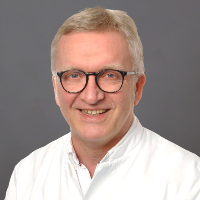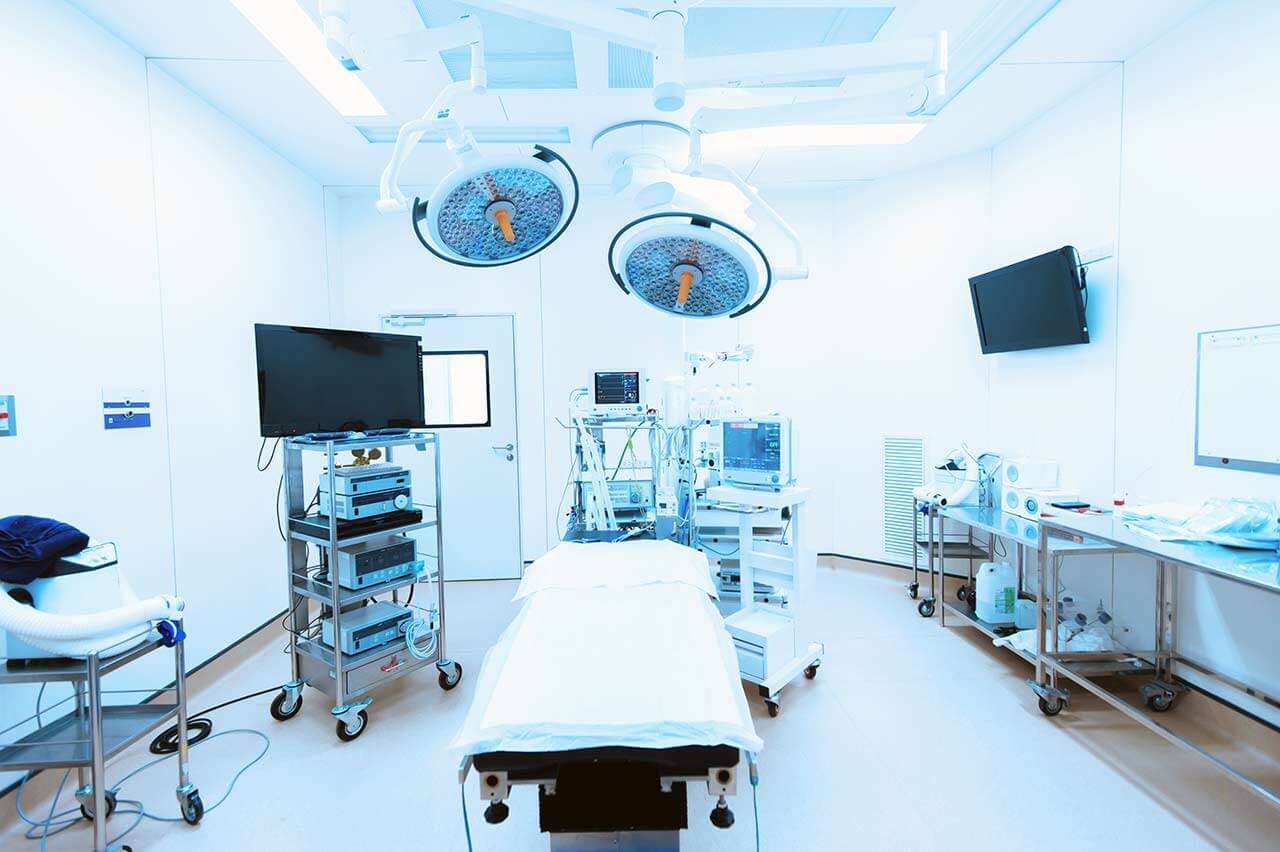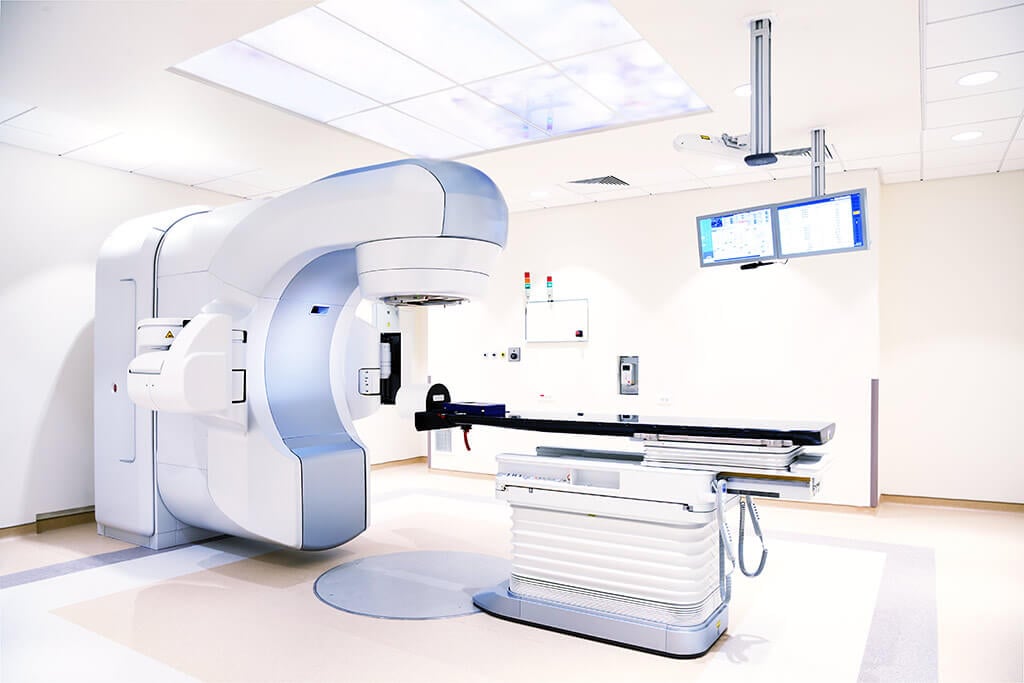
The program includes:
- Initial presentation in the clinic
- clinical history taking
- review of medical records
- physical examination
- laboratory tests:
- complete blood count
- general urine analysis
- biochemical analysis of blood
- TSH-basal, fT3, fT4
- tumor markers
- inflammation indicators (CRP, ESR)
- indicators of blood coagulation
- abdominal ultrasound scan
- CT scan/MRI or PET-CT of abdomen
- preoperative care
- cytoreductive surgery to remove visible tumors
inside the abdomen and HIPEC - histological and immunohistochemical
examination of removed tissues - symptomatic treatment
- cost of essential medicines
- nursing services
- stay in the hospital with a full board
- accommodation in a 2-bedroom ward
- elaboration of further recommendations
How program is carried out
During the first visit, the physician will conduct a clinical examination and go through the results of the available diagnostic tests. After that, you will undergo the necessary additional examination, such as the assessment of liver and kidney function, ultrasound scan and tomography of the abdominal organs. Based on the results of the examination, the physician will choose the surgical technique and the type of anesthesia. After that, preparation according to the preoperative standard will start.
Cytoreductive surgery begins with general anesthesia. The intervention is performed as open surgery, i.e. through the incision in the anterior abdominal wall, so that the surgeon can carefully examine the peritoneum and the surface of the abdominal organs. The surgeon removes affected by the malignant process ovaries, areas of the peritoneum and metastases in other internal organs. This stage of the operation can take several hours, since the overall effectiveness of the treatment depends on the completeness of the malignant tissues removal.
At the next stage of the operation, the surgeon inserts several catheters into the abdominal cavity. Through the catheters, a heated solution of a chemotherapy drug is pumped inside. The special system maintains the required temperature (42-43 degrees Celsius), pressure and circulation rate of the medicinal solution. The solution mechanically flushes out blood clots and remnants of malignant tissues, and a heated chemotherapy drug destroys micrometastases in internal organs and lymph nodes (micrometastases can’t be detected by the naked eye).
After 1-1.5 hours, the chemotherapy drug is removed from the abdominal cavity and the abdominal cavity is washed with saline. After that, the surgeon removes the catheters and sutures the incision of the anterior abdominal wall.
After the completion of the operation, you will be transferred to the ward of the intensive care unit, under the round-the-clock supervision of doctors and nurses. In 1-3 days after the operation, your drains will be removed and you will be transferred to a regular ward for further recovery. The whole treatment takes 10-12 days on average.
Finally, the attending physician will evaluate the results of control examinations, schedule the date of discharge from the hospital and give you detailed recommendations for further follow-up and treatment.
Required documents
- Medical records
- MRI/CT scan (not older than 3 months)
- Biopsy results (if available)
Service
You may also book:
 BookingHealth Price from:
BookingHealth Price from:
About the department
The Department of Gynecology, Mammology and Obstetrics at the Catholic Clinic Koblenz-Montabaur offers the full range of medical services in the areas of its specialization. The department's gynecologists successfully cope with the conservative and surgical treatment of diseases of the female reproductive system. The department specializes in surgery for uterine, cervical, and ovarian cancers. When performing surgery, preference is given to low-traumatic minimally invasive and endoscopic techniques. The doctors are also especially competent in the treatment of urinary incontinence and pelvic organ prolapse in women. Mammology is an integral part of the department's clinical practice. The specialists in this medical field provide top-class diagnostic and therapeutic services to patients with benign and malignant breast diseases. The department also admits men with gynecomastia. The medical facility offers comprehensive obstetric services, including pregnancy management, childbirth, and postpartum care for both mother and baby. The department has an advanced technical base and comfortable infrastructure, as well as the most pleasant atmosphere in which the patient feels the care and empathy of the medical staff. The department is headed by Dr. med. Jan Dünnebacke.
The primary focus of the department's work is gynecology. The medical facility admits patients with diseases of the genital organs, urinary incontinence, and pelvic organ prolapse. Women's health is in the safe hands of experienced gynecologists, who have all the modern facilities for laboratory diagnostics, ultrasound scanning and other instrumental examinations, conservative therapy, and sparing surgical treatment. The specialists in the fields of urology and general surgery are actively engaged in the therapeutic process to provide patients with comprehensive medical care.
The team of the department's gynecologists has exceptional competencies in endoscopic and minimally invasive interventions for diseases of the female reproductive system. In some cases, the specialists perform operations using a vaginal approach that do not require any incisions on the abdominal wall and exclude damage to the vaginal mucosa. It is therefore important for the department's doctors to provide patients not only with the most effective surgical treatment but, at the same time, to choose the most sparing techniques for performing the operation. Surgery for malignant neoplasms of the uterus, cervix, ovaries, and vulva is also mostly performed using low-traumatic surgical techniques, which is a great advantage for patients.
The department's special offer is the innovative NovaSure endometrial ablation technique. This treatment is indicated for women suffering from hypermenorrhea (heavy menstrual bleeding), which carries the risk of developing anemia and other serious health problems. The essence of the NovaSure procedure is to remove the thin inner mucous layer of the uterine cavity, which provokes heavy uterine bleeding. The operation takes only about 5 minutes and is performed on an outpatient basis, usually with sedation, but sometimes general anesthesia may be used as well.
The department offers the services of a certified Breast Center, whose doctors treat women with benign and malignant breast diseases, as well as men suffering from gynecomastia. The Breast Center is certified according to the standards of the German Cancer Society (DKG) and the German Society for Senology (DGS), which indicates a top-class level of medical care provided and high treatment success rates. The doctors follow the clinical guidelines of the German Cancer Society (DKG) and the Gynecological Oncology Working Group (AGO) in their work.
Of key interest to the department's breast specialists is the treatment of breast cancer, which is the most common type of oncology in women. When a woman with suspected cancer is admitted to the department, she undergoes comprehensive diagnostics, which usually include mammography, ultrasound scanning, magnetic resonance imaging, and a biopsy. If the diagnostic results confirm that the patient has breast cancer, her clinical case is considered during a weekly interdisciplinary tumor board, in which breast specialists, radiologists, radiation therapists, oncologists, and plastic surgeons participate. A treatment regimen is developed for each patient individually based on her specific clinical data. As a rule, the first-line therapy is surgery, whose extent depends on the stage of the oncological process. Doctors strive to preserve the breast if possible, but in the case of indications for its removal, the patient will be offered a reconstructive surgical intervention to repair the aesthetic appearance of the breast. Such surgical procedures are performed using silicone implants or the patient's own tissues. Surgery for breast tumor removal is often supplemented with conservative treatments such as chemotherapy, hormone therapy, radiation therapy, and immunotherapy.
The department also has a team of experienced obstetricians who provide high-quality care and monitoring throughout pregnancy. The department holds pre-pregnancy planning consultations, carries out pregnancy monitoring with regular ultrasound scans and other tests, and provides childbirth and postpartum care for both mother and baby. The department's obstetricians prefer natural childbirth, but if necessary, a C-section can be performed. Childbirth takes place in modern delivery rooms equipped with everything necessary for a successful delivery. Obstetricians and nurses have deep knowledge and vast experience, so if any complications develop, they will immediately take all the necessary measures. Babies always stay with their mother after birth (bonding) to promote early bonding between mother and child. If desired, the patient can receive pain management by means of homeopathic medicines, acupuncture, relaxation baths, etc. Drugs and epidural anesthesia can also be used for pain management.
The department's key clinical focuses include:
- Gynecology
- Minimally invasive and endoscopic interventions for gynecological diseases
- Sparing interventions through a vaginal approach for gynecological diseases
- Innovative NovaSure endometrial ablation procedure and classic endometrial ablation
- Hysteroresectoscopy for uterine fibroids
- Cervical conization
- Laser interventions for pathological vulvar lesions
- Urinary incontinence and pelvic organ prolapse surgery: placement of mesh implants, TVT sling procedures, etc.
- Extensive surgery for female genital cancers
- Mammalogy
- Diagnostics
- General clinical examination, including palpation
- Mammography
- Ultrasound scanning
- Magnetic resonance mammography
- Histological examination
- Biopsy
- Treatment
- Surgical treatment for breast cancer, including reconstructive surgery to repair the breast after its resection
- Conservative treatment of breast cancer: chemotherapy, hormone therapy, radiation therapy, and immunotherapy
- Diagnostics
- Obstetrics
- Comprehensive pregnancy management
- Safe childbirth (natural childbirth and C-section), including pain management during childbirth
- Postnatal care for mother and baby
- Establishing an early bond between mother and child (bonding)
- Other medical services
Photo of the doctor: (c) Katholisches Klinikum Koblenz - Montabaur
About hospital
The Catholic Clinic Koblenz-Montabaur is a modern medical facility with an excellent reputation in Germany and abroad. The medical center is an academic clinic of the University Hospital Mainz, which gives patients the opportunity to take advantage of scientific advances and innovative treatments. The clinic has the widest possibilities for providing effective medical care to patients with both common and especially complex and rare pathologies. In December 2017, the clinic was certified in accordance with DIN EN ISO 9001:2015 standards, and in 2020, it was successfully recertified, which is a confirmation of the high quality of medical service. The clinic has 20 departments with 17 highly specialized centers integrated into them. The bed fund of the medical facility includes 657 beds. More than 32,000 inpatients and about 133,000 outpatients receive medical care here annually.
Many medical specialties are available at the clinic, including general and abdominal surgery, bariatric surgery, vascular surgery, thoracic surgery, cardiology, pulmonology, gynecology, urology, neurology, orthopedics, traumatology, radiology, nuclear medicine, and others. Each of the medical specialties is represented by an experienced team of doctors and nursing staff who do their best to restore the patient's health. Doctors of various medical fields work in close cooperation, which allows for an interdisciplinary approach to solving health problems.
The pride of the clinic is the advanced technical base, which plays an important role in accurate examinations and effective treatment. For example, the operating rooms at the clinic are equipped in accordance with the current requirements of European medicine, due to which most surgical interventions are performed using sparing techniques, including laser surgery, video-assisted thoracoscopic surgery, arthroscopy, endovascular and hybrid surgical techniques, etc.
Despite the clinic's high-tech infrastructure, there is an atmosphere of understanding, sympathy, and respect for the patient. The medical team shows a humane attitude towards patients and takes care of their comfort throughout the entire period of treatment. Doctors devote enough time to personal communication with patients, which makes it possible to take into account their individual needs and wishes during the therapeutic process.
Photo: (с) depositphotos
Accommodation in hospital
Patients rooms
The patients of the Catholic Clinic Koblenz-Montabaur live in comfortable single and double rooms with light colors and modern design. Each patient room has an ensuite bathroom with a shower and a toilet. The furnishings of a standard patient room include an automatically adjustable bed, a bedside table, a wardrobe, a table and chairs for receiving visitors, and a TV. The telephone is provided for a fee. Wi-Fi is available upon request.
The clinic also offers enhanced comfort rooms corresponding to the level of a five-star hotel. These patient rooms are more spacious and have a sophisticated design. The bathroom of the enhanced comfort rooms has a set of toiletries, changeable towels, and a bathrobe.
Meals and Menus
The patient and the accompanying person can choose meals from three menus daily. If, for some reason, you do not eat all the foods, you will be offered an individual menu. Please inform the nursing staff of your dietary preferences prior to treatment.
Patients living in enhanced comfort rooms are additionally offered free soft drinks, coffee, tea, desserts, and fresh fruits.
Further details
Standard rooms include:
Religion
A Catholic liturgy is held every Sunday morning in the church at the clinic. The divine liturgy is also broadcast on the clinic's internal TV channel.
Accompanying person
Your accompanying person may stay with you in your patient room or at the hotel of your choice during the inpatient program.
Hotel
You may stay at the hotel of your choice during the outpatient program. Our managers will support you for selecting the best option.





